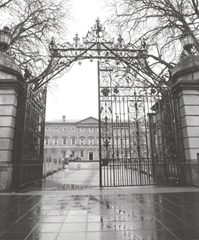Electoral (Amendment) (Political Donations) Bill
 Purpose: to amend the Electoral Acts and to implement political funding commitments set out in the Programme for Government.
Purpose: to amend the Electoral Acts and to implement political funding commitments set out in the Programme for Government.
Despite a dry title, the Electoral Amendment (Political Donations) Bill has the potential to provide major electoral reform in Ireland.
The crux of the bill is to effectively ban corporate donations, set new rules for political funding and impose lower thresholds, above which donations have to be declared.
Based on recommendations from the Moriarty Tribunal, the Bill was presented to the Dáil by Fianna Fáil on 7 April. Tánaiste Eamon Gilmore told members that plans to end corporate donations would proceed.
The proposed legislation comes after the Programme for Government pledged to “introduce the necessary legal and constitutional provisions to ban corporate donations to political parties”.
Under the plans, corporate donations would be effectively banned but individuals could still make donations within set limits.
The bill states that maximum donations from individuals to national political parties in a calendar year would be reduced from the current level of €6,348.69 to €2,500. It would also cut the maximum donations to candidates from the current limit of €2,539.48 to €1,000.
At present, all donations of more than €5,078.95 from individuals to political parties must be disclosed to the Standards in Public Office Commission (SIPO), which publishes the names of donors and recipients. Under the Bill, this would be reduced to €1,500. The disclosure level for candidates would be reduced from €634.87 to €600.
It would also mean that any donation from a company, society or building society, which is more than €100, must be declared.
The time within which a presidential candidate is required to publish a presidential election donation statement would also change under the plans, from 56 days after polling day to 25 days after polling day.
The Bill states that all political parties would have their accounts audited on an annual basis by the SIPO. After the audit, a copy of the accounts would then be published and this would include the size and amount of all donations, whether the identity of the donor is publishable or not.
Eamon Gilmore has confirmed that the new legislation would also apply to trade unions, ensuring that no potential funding loophole could be created by the new donation rules.
There would be “no distinction” drawn between donations from corporate entities or trade unions, he said. However, Labour representatives have argued for this to be reviewed, stating that this type of funding does not amount to corporate donations.
Fianna Fáil has said that it intends to push for a constitutional amendment later this year to allow for the introduction of a “more comprehensive” ban on corporate donations. Micheál Martin explained that this approach was taken because of legal advice that a complete ban would most likely be unconstitutional.
He is calling for a referendum on the “effective” ban on corporate donations to political parties on the same day as the presidential election, expected later this year.
First stage : 7 April
Second stage: Pending





